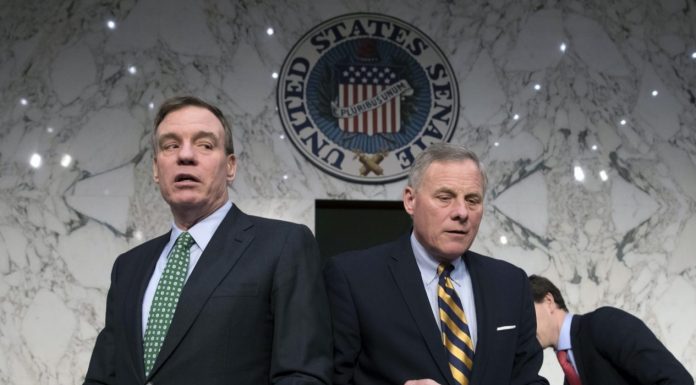(Headline USA) The Trump campaign’s interactions with Russian intelligence services during the 2016 presidential election posed a “grave” counterintelligence threat, a Senate panel concluded Tuesday as it detailed in a report how associates of the Republican candidate had regular contact with Russians and expected to benefit from the Kremlin’s help.
It is the fifth and final one from the Republican-led Senate intelligence committee on the Russia investigation, describes how Russia launched an aggressive, wide-ranging effort to interfere in the election on Donald Trump’s behalf.
However, the 966-page report also touches on the role that deep-state intelligence officials played in facilitating many of those contacts as part of their bid to entrap Trump officials in a sting operation.
Only by creating a plausible reason for concern would members of the FBI, CIA, State Department and other agencies that viewed the Trump presidency as an existential threat be allowed to eavesdrop and gather further intelligence via the Foreign Intelligence Surveillance Act on the campaign.
In doing so, they foisted Trump advisers such as Carter Page and George Papadopoulos into the seedy underworld of globalist spy networks where they encountered liaisons like Joseph Mifsud and Stefan Halper, both university professors working in Europe who were recruited as paid intelligence sources to collude in the framing of the campaign.
After the FBI was able to provide sufficient justification for its “Crossfire Hurricane” operation, it recruited notorious dossier author Christopher Steele and later—after Steele was discredited as being personally biased—used back-door channels to access Steele’s reports, which drew from unreliable Kremlin-linked sources to make salacious, now-debunked claims about then-candidate Donald Trump.
The new report, however, claims Trump associates were eager to exploit the Kremlin’s aid, particularly by maximizing the impact of the disclosure of Democratic emails that were hacked by Russian military intelligence officers.
The conclusions mark the culmination of a bipartisan probe that spanned more than three years and produced what the committee called “the most comprehensive description to date of Russia’s activities and the threat they posed.”
The report was released as two other Senate committees, the Judiciary and Homeland Security panels, conduct their own reviews of the Russia probe with an eye toward uncovering what they say was FBI misconduct during the early days of the investigation.
A prosecutor appointed by Attorney General William Barr, who regards the Russia hoax prior investigative efforts with skepticism, disclosed his first criminal charge on Friday against a former FBI lawyer who plans to plead guilty to altering a government email.
Among the accusations outlined in Tuesday’s report is the committee’s description of the close professional relationship between former Trump campaign chairman Paul Manafort and Konstantin Kilimnik, whom the committee describes without equivocation as a Russian intelligence officer.
“Taken as a whole, Manafort’s high-level access and willingness to share information with individuals closely affiliated with the Russian intelligence services, particularly Kilimnik, represented a grave counterintelligence threat,” the report says.
The report said Manafort shared internal Trump campaign polling data with Kilimnik and that there is “some evidence” that Kilimnik may have been connected to the Kremlin’s operation to hack and leak Democratic emails, though it does not describe that evidence.
The claims that the Kremlin was behind the hack remain in dispute. The FBI relied up the highly partisan cybersecurity firm CrowdStrike to conduct the forensic analysis of the servers, and that the servers themselves had been destroyed, prohibiting any further analysis.
However, many—including Wikileaks founder Julian Assange—have hinted that it might have been a leak from within the DNC. A key former Bernie Sanders supporter Seth Rich, who was shot and killed in July 2016 outside his apartment in an apparent robbery although no personal effects were taken.
The report says that “two pieces of information” raise the possibility of Manafort’s potential connection to those operations, but what follows next in the document is blacked out.
Both men were charged in Mueller’s investigation, but neither was accused of any tie to the hacking.
A Manafort lawyer, Kevin Downing, said Tuesday that there is information that was sealed at the request of Mueller’s team “that completely refutes whatever the intelligence committee is trying to surmise.” He added: “It just looks like complete conjecture.”
The report purposely does not come to a final conclusion, as the other reports did, about whether there is enough evidence that Trump’s campaign coordinated or colluded with Russia to sway the election.
A group of Republicans on the panel submitted “additional views” to the report saying that it should state more explicitly that Trump’s campaign did not coordinate with Russia.
But Democrats on the panel submitted their own views, arguing that the report clearly shows such cooperation.
Mueller concluded in a report issued last year that Russia interfered in the election through hacking and a covert social media campaign, but he did not charge any Trump associates with conspiring with Russians.
The Senate investigation also delved into areas of great interest to Trump that were not explored by Mueller. Those include the FBI’s reliance on a dossier of opposition research compiled by a former British spy whose work was financed by Democrats.
Much of the work was done under the direction of retiring Sen. Richard Burr, R-NC, and ranking minority member Mark Warner, D-Va.
Burr recently resigned the leadership post, though, following a recent insider trading scandal in which he was revealed to have bought and sold stocks likely to be impacted by the coronavirus pandemic after receiving an intelligence briefing—but before it became public knowledge.
Sen. Marco Rubio of Florida, the committee’s acting chairman, said in a statement that the committee was troubled that the FBI had been willing to use the dossier “without verifying its methodology or sourcing” as it applied for secret surveillance warrants against a former Trump campaign adviser.
Adapted from reporting by the Associated Press.

